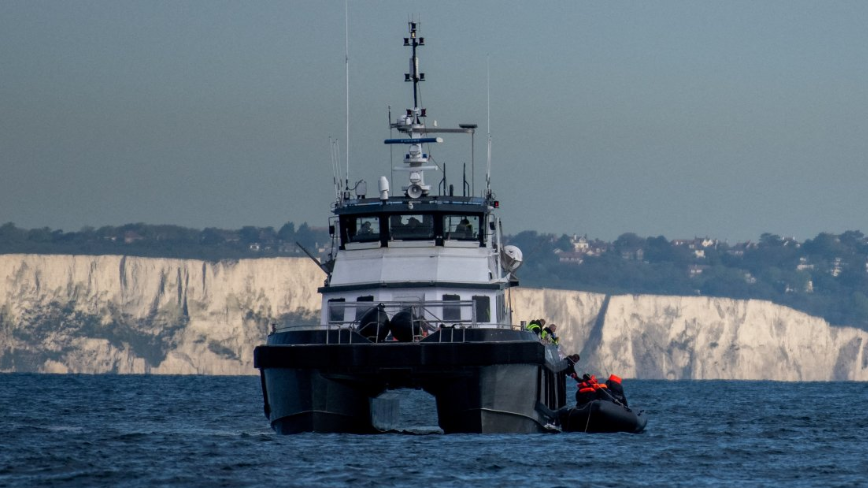Home Office criticised for billions of asylum overspending

- Published
A think tank has blamed "woeful budgeting" at the Home Office for repeated overspending on asylum support.
Over the last three years, the department's initial estimated budgets for asylum, border, visa and passport operations amounted to £320m.
But the Institute for Fiscal Studies (IFS) said it had ended up spending £7.9bn over the period, £7.6bn more than forecast.
The IFS also warned the department had submitted figures it "knows to be insufficient" for this year.
Rachel Reeves's spending audit at-a-glance
- Published29 July 2024
UK aid spending on asylum seekers rises again
- Published10 April 2024
The think tank said the higher spending reflected an increase in the number of people seeking asylum and the cost of housing people in accommodation like hotels.
It said there was also increased spending on special visa and resettlement schemes, most notably for Afghanistan and Ukraine.
However, the think tank said asylum costs had now been elevated for several years so higher spending was "entirely foreseeable".
A Home Office spokesperson said: "This government is determined to restore order to the asylum system so that it operates swiftly, fairly, and in the interest of taxpayers."
The department said the "costly" Rwanda deportation scheme had been scrapped and it was also "taking immediate action to clear the asylum backlog and reduce the use of expensive hotels".
Last month Chancellor Rachel Reeves put an estimated £6.4bn asylum overspend at the heart of a £22bn "black hole" in spending for this year which she said she had inherited from the Conservatives.
A Labour spokesperson accused the previous Tory government of having "covered up the true extent of the crisis" in the Home Office.
"They knowingly overspent on departmental budgets, covered it up, called an election and ran away from the problem, leaving a £22bn black hole in the country's finances for Labour to clean up," they told BBC News.
The Conservatives have been contacted for comment.
The Tories have previously insisted they were open about the state of the public finances while in power and disputed the idea of hidden overspends.
Government departments submit estimated spending to Parliament up to four times a year, so that MPs can approve the use of public money in advance.
According to Treasury guidance, departments must ensure their estimates are "consistent with their best forecasts of requirements", which the IFS report says "certainly does not appear to be the case" for the Home Office.
IFS research economist Max Warner said estimates should not be "unrealistically low" and fail to identify spending "that the government knows will occur but does not want to budget for".
"There is a strong case that the current budgeting process is failing for asylum spending," he said.
He added that the Home Office had got into a "bad habit of submitting initial budgets to parliament that it knows to be insufficient", expecting the Treasury to top this up from reserves later in the financial year - as happened last year, when its asylum budget was topped up by more than £4bn.
He said: "When there is a one-off unexpected spike in costs or demand, spending more than was budgeted is entirely understandable.
"But when it is happening year after year, something is going wrong with the budgeting process."
A Home Office spokesperson said: "We have been clear the prior approach was to fund the majority of asylum system costs through the Supplementary Estimate. As part of the ongoing Spending Review, in future we are seeking to include these costs in the Main Estimate."
Conservative shadow home secretary James Cleverly, who was in charge of the Home Office until July, said: "Border control has never been free."
By scrapping the Tories' scheme to send some asylum seekers to Rwanda, he added, "the asylum bill will soar for taxpayers under Keir Starmer’s government".
“The government must urgently come forward with a plan to stop illegal boat crossings and end the use of expensive hotels to manage down costs."
The department's budgeting has also been repeatedly criticised by the Commons home affairs select committee.
Despite this, the IFS highlighted how the same pattern appeared to be playing out again this year, with the Home Office already saying its estimated asylum spending for the year would not be "sufficient", despite a £1.5bn top-up.
An additional £4bn was "almost inevitable" on top of that, it added, despite an estimated £800m saving from scrapping the previous government's Rwanda scheme.
Mr Warner warned that, while top-ups had previously been made from the Treasury's reserves, the reserves available for this year seemed to have already been earmarked for elsewhere, and so might not be available this time round.